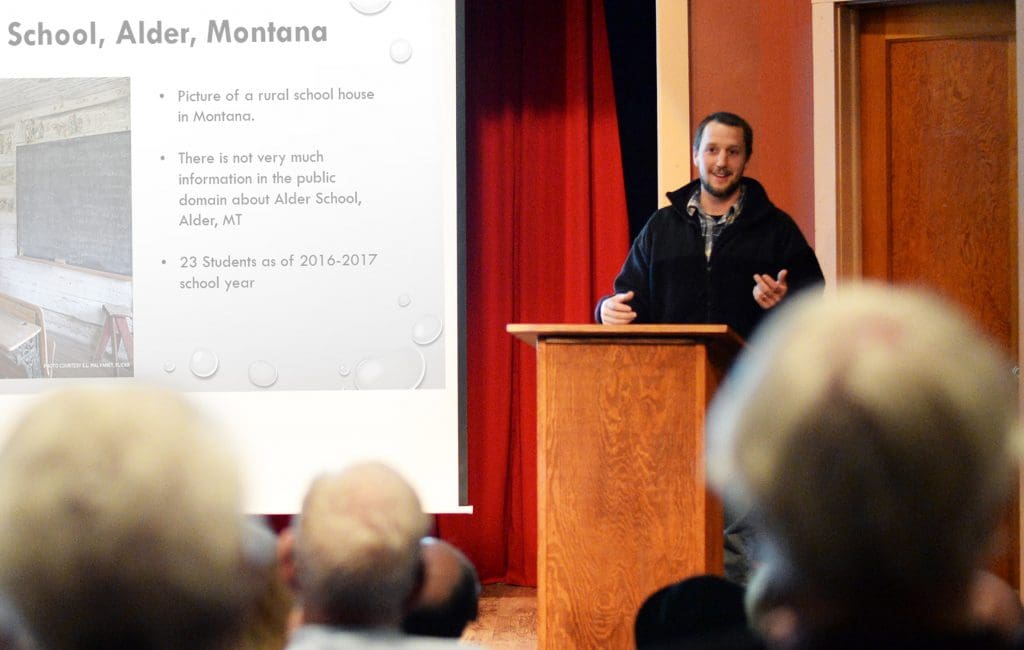December 6, 2016
University of Montana Western Assistant Professor of History Erin Zavitz recently received a grant from Humanities Montana to fund the “Voices from Montana’s Rural Schools: An Oral History” project.

University of Montana Western Assistant Professor of History Erin Zavitz recently received a grant from Humanities Montana to fund the “Voices from Montana’s Rural Schools: An Oral History” project.
Humanities Montana is Montana’s independent, nonprofit affiliate of the National Endowment for the Humanities. The organization has benefited hundreds of Montana organizations and thousands of its citizens, providing support for public programs in the humanities throughout the state.
The generous grant specifically funded the oral history class project, allowing Zavitz’s students to interview past and current students and teachers of Montana’s rural schools.
“In my experience, oral history is a great way to capture the stories of ordinary people who are typically omitted from written history, but have an important impact on our communities,” Zavitz said. “Ultimately, the stories collected from these extraordinary individuals make up our personal understanding of history.”
Oral histories are collected recordings of interviews in which individuals relay their personal knowledge of past events. The recordings are then archived and revisited for historical reference.
The grant helped fund travel costs for students to drive to southwest Montana’s remote schools to interview and record rural students and teachers. It also allowed Zavitz to bring in speakers knowledgable about the subject matter, including Christine Brown the Outreach and Education Director from Montana Preservation Alliance and oral history expert Clay Scott with Montana Public Radio’s “Mountain West Voices.”
“I have training in oral history methods and wanted to create a class that combined my knowledge with Montana Western’s tradition of supporting rural education,” Zavitz said. “I was impressed with my students’ level of engagement throughout the process and the final products they produced, which revealed rich details about Montana’s rural schools.”
Montana Western has a long-standing dedication to rural education, dating back to its beginnings as the state’s teacher training institution in the 1890s, then known as the Montana State Normal School.
Today, the university honors its history with its Rural Fridays program, which brings elementary school children from their rural schoolhouses to Montana Western. They are taught by student teachers and take advantage of the campus’ state-of-the-art facilities, including the new model classroom. The state-of-the-art facility showcases the latest technology and educational tools for a better learning environment.
“I knew that rural education and oral history would lend itself to remarkable storytelling from rural teachers faced with significant challenges and it would involve a great deal of field experience for the students,” Zavitz said.
The flexibility of Montana Western’s Experience One program allows students to focus on one class at a time for 18 days and have meaningful hands-on learning opportunities directly related to their field of study.
“I know I wouldn’t have been able to participate in an oral history project like this at any other school,” interdisciplinary social science and secondary education major Miranda Martinez said. “Montana Western presents unique projects and programs that give students a well-rounded, experience-based education.”
The project was the first time any of the students had created an oral history record, used it as a source for a research paper and submitted it to the local museum archives as a form of preservation.
Rural Schools are an important aspect of Montana’s unique history, Zavitz explained. Montana is home to the most operational rural schools in the country as well as hundreds of abandoned one-room schoolhouses across the state.
“This was a fun idea and a great cause to be part of,” secondary education and modern history major Jeff Stanek said. “Rural schools are considered a dying form of education, and yet they foster meaningful learning experiences that are fashioned to the individual student, their interests and learning style.”
After the class, students gave presentations to community members at the Beaverhead County Museum’s Depot theater. They talked about logistical challenges, influences of technology, the benefits of learning in a smaller rural school and the importance of preserving the buildings and the unique style of learning.
“The oral history project opened my eyes to just how many rural schoolhouses exist throughout Montana,” Martinez said. “I’m grateful to Professor Zavitz and Humanities Montana for allowing me to be a part of telling the stories of the students and teachers of these schools to future generations.”
— Montana Western —